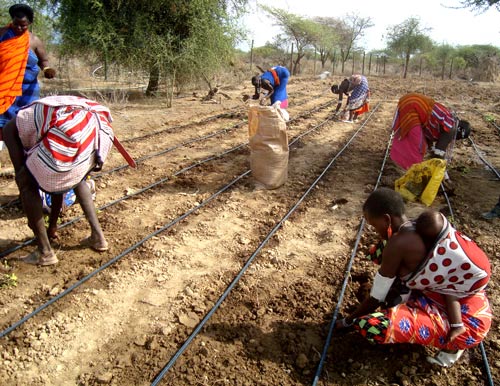By Silvia Muburu
CIKM facilitator, KeFAAS
 Food security and economic crisis have highlighted both the urgent need and potential for developing sustainable agricultural systems. Nearly one billion people – one out of nine globally – lack access to adequate food and nutrition. It is envisioned by 2050 the global population will surpass 9 billion people, and demand for food is expected to double. All these will be happening within the constraints of water scarcity, climate change among others.
Food security and economic crisis have highlighted both the urgent need and potential for developing sustainable agricultural systems. Nearly one billion people – one out of nine globally – lack access to adequate food and nutrition. It is envisioned by 2050 the global population will surpass 9 billion people, and demand for food is expected to double. All these will be happening within the constraints of water scarcity, climate change among others.
The Covid 19 was an unseen epidemic that is threatening to affect millions of people already made vulnerable by food insecurity, malnutrition and the effects of conflict and other disasters. In addition the quarantine measures is limiting access to markets and supply chain disruptions resulting in food loss and waste could affect supply.
Farmers are the main actors in global food provision since they play a very critical role in eradicating hunger and poverty, providing food security and nutrition, improving livelihoods, managing natural resources, protecting the environment, and attaining sustainable development particular in rural areas.
Agriculture Extension and Advisory Services practitioners have been concerned with all sorts of farmers consisting of livestock breeders, fisher folk and farm families. These clusters are responsible for 90% of all foods consumed in the world. Therefore agricultural interventions that ignore this basic fact will be unsustainable in the long run.
The sharp increases in food prices will occur in global and national markets in current years, and ths will result to increase in the number of hungry and malnourished people. Their need to sharpen the awareness of policy-makers and of the general public to the fragility of the global food system.  This calls for the stakeholders to implement measures outlined below in coordinated manner in order to maximize the farmers potential, ensure food security and maintain valuable resources of land water sustainability during the global Covid crisis and in future.
This calls for the stakeholders to implement measures outlined below in coordinated manner in order to maximize the farmers potential, ensure food security and maintain valuable resources of land water sustainability during the global Covid crisis and in future.
- Formal recognition of status and profession of all farmers of the world and engaging them through specific proposals, technical assistance and national/ intercontinental exchanges that will formulate more effective and responsive policies in their support.
- Strengthen the capacity of farmers especially in developing countries for independent in puts on project analysis and design, critical assessment and monitoring of their agricultural activities in their respective countries.
- Strengthen the interaction of farmer forums in public-private partnerships. The current world population stand at 9 billion, to feed the affected population by the pandemic now and beyond requires producing more food with fewer resources while reinvigorating the rural economies. This will be achieved through closer collaboration, investments and innovations among all stakeholders.
- Ensure access to resources. Farmers need secure access to natural, economic and produce resources on a long term basis. Their rights to land must be secured in regard to land acquisitions. Granting secure land titles to farmers, especially for women farmers who from the highest percentage of farming population national development activities that affect agricultural land.
- Increasing funding research and technological transfer. The research agendas must address the real needs of small scale farmers by building on local indigenous knowledge and adding value to locally available resources
- Scale up nutritional support
